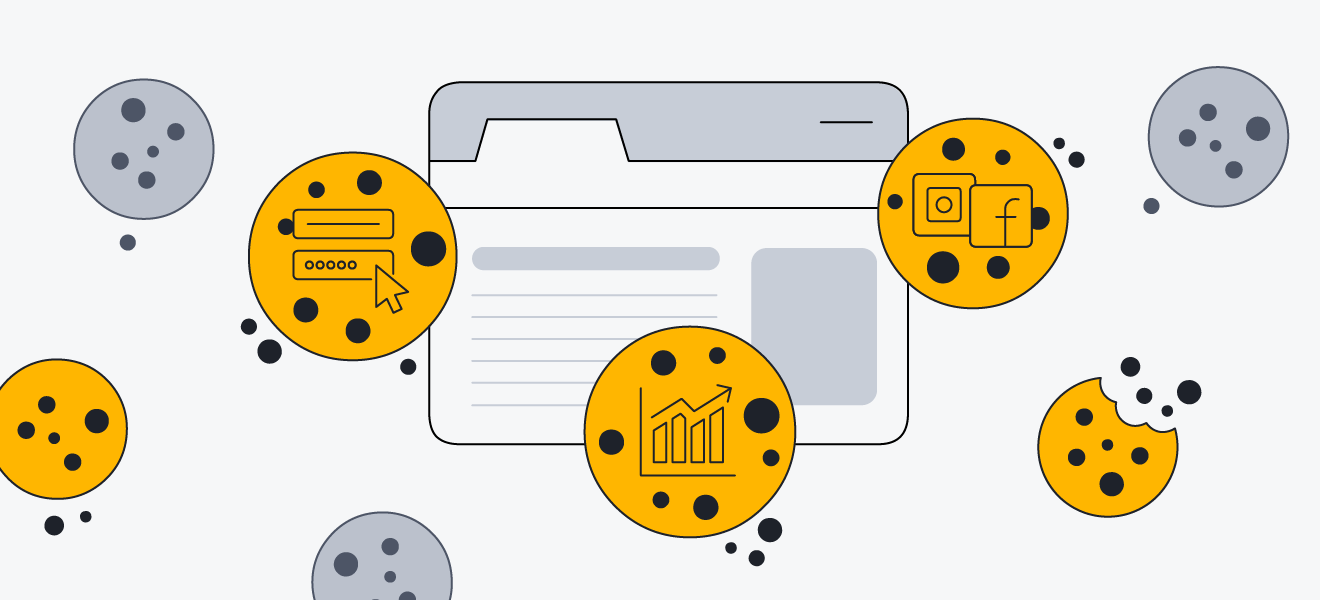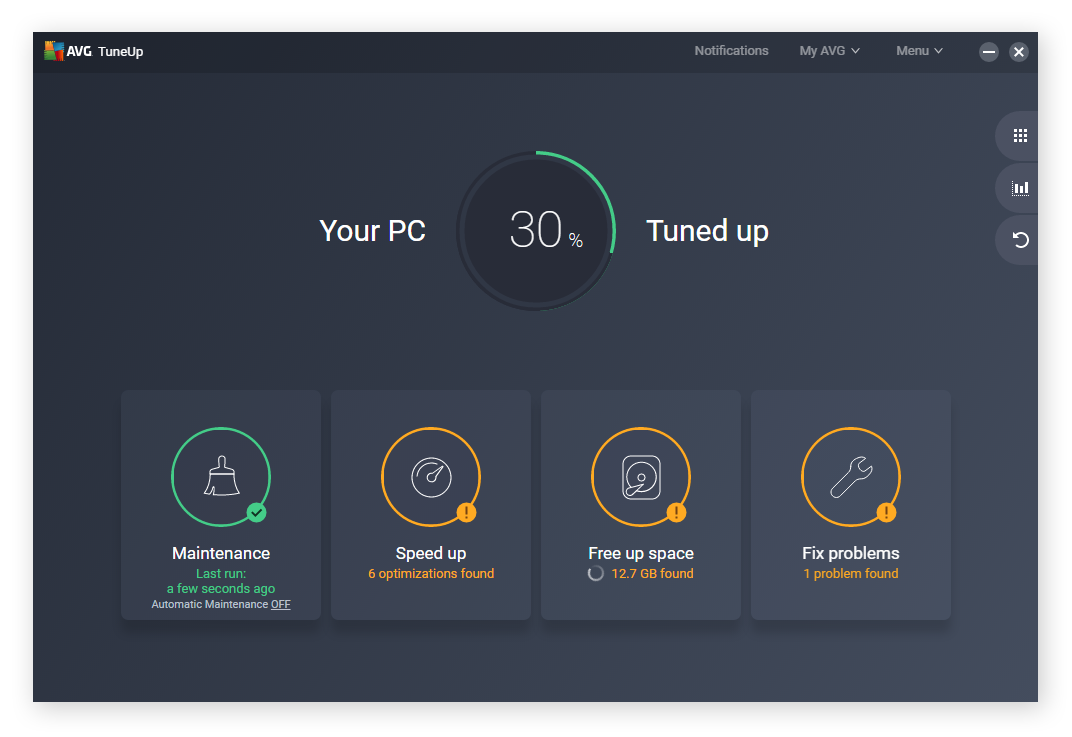What is a cookie?
An internet cookie is a small data packet or text file that usually includes a website’s name and a unique user ID. Also called computer cookies, browser cookies, internet cookies, or HTTP cookies, web cookies are created and sent by websites and stored on your computer or browser whenever you request information from a site.
What do cookies do, exactly?
Websites use cookies to perform essential internet functions, like remembering who you are, maintaining your settings, remembering what you’ve clicked on, and more. Cookies let you stay logged in to websites, use them in your preferred language, navigate ecommerce sites with items saved in your shopping cart, and more.
Cookies that help websites carry out critical functions are called first-party cookies. We wouldn’t be able to use many parts of the web without them.
Other cookies can track your browsing activity. These so-called third-party cookies aren’t necessary and can invasively follow you around the web.
First-party cookies help websites store and remember important information, including:
 Previously-visited web pages
Previously-visited web pages
Websites use cookies to remember the pages you visited — on their site and also sometimes on other websites. Cookies can store items you added to your shopping cart and keep track of cities and hotels you looked at on travel sites.
 Personal information
Personal information
Cookies can store personal information, such as the user account data and login information you use to access certain sites, your language preferences, your shipping address, and more.
 Website data
Website data
Websites use the data and other info gathered by cookies to learn how people find them and how they navigate their sites. This helps websites improve their performance and deliver better experiences to their visitors. Marketers also use data collected by cookies to improve their products and provide a better service to their customers.
How do cookies work?
Cookies track visits and clicks on websites. When you visit a site that uses cookies, your device downloads a data file with information about the website. The next time you visit, your device checks to see if it has a cookie from that site and uses that data to log you back in, adjust your preferences, and otherwise speed up your browsing.
If the cookie from your computer tells a website that you’ve visited before, then the site can enter your account details so you don’t have to remember and enter that information again. The web would be very frustrating without cookies, because the information that helps us easily navigate sites would be lost.
Rather than returning to an online shopping site and finding all the items you previously added to your shopping cart still there, you’d see an empty basket. Instead of going to a weather site and seeing your local forecast immediately, you’d actually have to enter your location.
Do all websites use cookies?
Almost all websites use cookies, but the number of cookies they use and their purpose can vary quite a bit.
-
E-commerce sites use cookies to keep track of items in your cart and items you previously browsed. That information helps them make smarter suggestions as you continue shopping. When you check out, cookies help sites retrieve any billing or shipping information you’ve already provided, speeding up the check-out process.
-
Travel sites use cookies to keep track of trips you’ve planned, hotel reservations you’ve made, and places you’ve visited.
-
Sports and entertainment sites use cookies to remember your interests and preferences, like your favorite teams and the tv shows you’ve been streaming.
-
News sites use cookies to find out if it’s your first or thirtieth visit, and adjust the content they show you accordingly. If they know your location, news sites may also serve you more localized content.
By letting sites remember information their visitors already provided and personalizing or localizing content, cookies make it much easier for you to navigate the web. But there are also downsides.
Are cookies safe?
Cookies are generally safe, but sometimes they can be used to track your behavior and undermine your privacy. First-party cookies are usually safe, but third-party cookies can impact device performance and expose your personal data and browsing habits to security threats. Cookies aren’t exclusively bad or good, nor safe or unsafe — it’s more nuanced than that.
As you navigate the web, every link you click on leaves a trail of digital breadcrumbs. Over time, as more and more cookies are stored in your browser, your browser gets bloated and slows down. That’s why it’s important to clear your cookies periodically, because cleaning up your computer can help speed it up.
 Cookies make the web work. But too many cookies can slow down your browsing and erode your privacy.
Cookies make the web work. But too many cookies can slow down your browsing and erode your privacy.
Practicing good browser hygiene is not just a matter of optimal device performance; it also protects against unwanted privacy intrusions. Cookies track your online activity, and businesses and marketers use that data to map your browsing habits and target you with personalized ads. Having your personal information end up on a random marketing list may make you a bit uneasy.
Also, if sensitive information stored in your cookies gets into the wrong hands or is sold to data brokers, your privacy and security can be compromised even more. That’s why regularly cleaning your browser makes it safer and helps safeguard your personal data.
Cookies are practically unavoidable on the modern web, but exposing your sensitive personal data isn’t. Switch to AVG Secure Browser and you’ll enjoy an extra layer of protection as you shop, bank, and browse. Get state-of-the-art anti-tracking technology, automatic ad blocking, forced HTTPS for security, and much more.
The law around cookies
In most parts of the world, the responsibility of managing cookies belongs to individual users. If you don’t want a particular website tracking you online, you have to go into your settings and block that site’s cookies yourself. But in Europe, the use of cookies is covered by two separate regulations:
The ePrivacy Directive
The ePrivacy Directive, also known as the “cookie law,” is an EU directive that covers the confidentiality of online communications and the permissibility of tracking. Originally passed in 2002, and updated in 2009, it requires all EU states to update their legal codes to comply.
The General Data Protection Rule (GDPR)
The General Data Protection Rule (GDPR) defines the personally-identifying data stored in cookies as personal data. That data belongs to the individual user, so websites and businesses can’t process it without either receiving consent or having a legitimate reason.
You might remember receiving a wave of notifications about GDPR from various sites back in 2018. That was because part of becoming GDPR compliant meant that websites had to let their European visitors know how their data was being used.
How long do cookies last?
A cookie’s expiration date is set when the cookie is created. Session cookies store data only for the duration of your visit and expire when you close your browser window. Persistent cookies can remain on your device much longer, depending on the cookie’s expiration date.
If your device’s performance is lagging and simple tasks now take ages to execute, it could be because of all the cookies that get stored on your device each time you visit a web page. Thankfully, cleaning up your device and removing unwanted cookies is simple with AVG TuneUp, an advanced PC optimization tool.
 Removing unwanted cookies is simple with AVG TuneUp.
Removing unwanted cookies is simple with AVG TuneUp.
Can other people see your cookies?
Other people can see your cookies if you’re visiting unsecured (HTTP) websites or if they have physical access to your device and your account. While cookies help sites identify you across different browsing sessions (to keep you logged in), for security reasons, websites can typically see only those cookies that they create.
But some websites use third-party cookies that can read, gather, and share tracking information from a variety of sites. Many advertising companies use third-party tracking cookies to serve targeted ads or other offers.
How to manage your cookies
Cookies are stored in your web browser, so how to manage them varies depending on the browser you’re using. Here are the most common ways to manage your cookies:
Enabling and disabling cookies
Most browsers make it pretty easy to change your cookie preferences on their settings page. But knowing how to enable or disable cookies in your browser depends on what browser you’re using:
-
Chrome and Microsoft Edge: Privacy & Security > Cookies
-
Firefox: Options > Privacy & security > Cookies
-
Safari: Preferences > Privacy > Cookies
In the cookies section, you’ll find options for enabling and disabling cookies.
Checking your cookies
Before changing your cookie settings, you should check to see which cookies are stored on your device and browser. Most browsers let you do this on their settings page. After viewing your cookies, you may opt to keep them active for sites you trust or visit often, or you may want to delete them to increase your privacy.
Removing your cookies
How to remove your cookies depends on which browser you’re using. See our full guide on how to delete cookies on different browsers. Then, tighten your privacy even further by clearing your browsing and search history. Note that after doing so you’ll need to re-enter any login information for sites that require that.
Manage and clean up your cookies with AVG TuneUp
If you’re uncomfortable with targeted ads, worried about websites tracking your personal data, or frustrated with lagging device performance, clearing out your cookies is a great way to whip your device into shape. Try AVG TuneUp to get your device working like the day you first turned it on.

 Cookies make the web work. But too many cookies can slow down your browsing and erode your privacy.
Cookies make the web work. But too many cookies can slow down your browsing and erode your privacy. Removing unwanted cookies is simple with AVG TuneUp.
Removing unwanted cookies is simple with AVG TuneUp.




